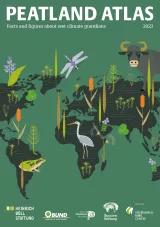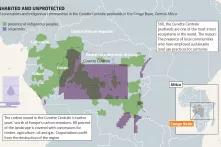The peatlands of Africa's Cuvette Centrale in the Congo Basin store more carbon than the rainforest that overhangs it. But peat is only valuable as a carbon store if it remains water-saturated and untouched in the soil. What has kept the peat locked up until now is the lack of roads and other infrastructure. Irene Wabiwa Betoko, International Project Leader, Congo Basin Forest of Greenpeace Africa, talks about the threats facing peatlands in the Congo Basin and discusses ways to protect them.

Inka Dewitz: Why is the Congo Basin so important for climate stability?
Irene Wabiwa Betoko: The Congo Basin is the world’s second largest tropical forest after the Amazon and one of the biggest carbon sinks. Its contribution to climate stability is huge but the forest also plays other important roles. The Congo Basin is a biodiversity hotspot and home to many endangered species. And it is home to millions of people, communities of which 70% depend on this forest for their survival.
The forest and its peatlands are so far among the most intact in the world – not because of government efforts but because of their inaccessibility. Unfortunately, the Congo Basin is threatened for several reasons.
What are these threats?
In July 2022, the government of the Democratic Republic of Congo opened an auction for 27 onshore oil blocks and 3 gas blocks in Lake Kivu. The size of the area that would be impacted equals the size of the United Kingdom.
Scientists warn that the auction of the oil block threatens 11 million hectares of tropical forest including one million hectares of peatland. Peatlands are the most effective natural carbon sinks – the Congo Basin peatlands store more than 30 billion tons of carbon and are home to a wide array of wildlife.
Scientists have recommended that there should be no industrial activity allowed in this very sensitive ecosystem. Otherwise it will lose its capacity to store carbon and instead turn into what we call a “carbon bomb” as it will release billions of tons of carbon with disastrous effects for humanity and the planet.
Apart from the oil blocks, the peatland is also threatened by logging – already being carried out by an FSC-certified (Forest Stewardship Council certificate for sustainable timber management) multinational company in the peatlands of Congo-Brazzaville –, as well as the conversion of forest into agricultural land and mining.
How is Greenpeace working to protect the peatlands?
Right now, we’re campaigning to keep as many oil companies as possible away from the auction and keep pressuring the government to stop it. We’ve contacted Total, BP, Shell and many others to warn them about the disastrous effects that the destruction of the Congo Basin forest would have for their reputation. All of these big companies told us they won’t take part in this auction. Only the Anglo-French company Perenco declined to comment when contacted by media – and has proceeded to bid for two blocks. The bidding has been delayed numerous times due to a lack of interest. Results might be known by March 2024.
We conducted a series of trainings and capacity buildings in different areas with local communities and authorities. We invited scientists who spoke about the importance of peatlands for people and the climate and explained which activities harm this ecosystem and why.
What particular challenges do you face in your work?
The first challenge is bad governance. This concerns the DRC from where I’m operating and actively campaigning. This peatland is a highly sensitive ecosystem and protected under the Ramsar Convention, an intergovernmental treaty on wetlands. This international convention is however not respected nationally. So far, there has been a lot of conversation about the fact that we need specific national regulations for peatland protection. But this is not the case yet. That’s why the DRC government is able to auction oil blocks within the peatlands.
Another obstacle is the lack of information on the importance of peatland at certain governmental levels. The communities that have been living within this ecosystem know it is crucial for their survival and their traditional ways of using the peatland are not harmful. But they didn’t know until recently, what critical role it plays for global climate stability. And local authorities don’t know either.
According to the national law of DRC, oil concessions can be allocated anywhere – even in national parks – as long as oil activity isn’t “incompatible” with conservation! So the challenges we face are bad governance and a lack of information amongst local authorities.
The rainforest of the Congo Basin spans across six countries - why is the DR Congo so central to the protection of this ecosystem?
Yes, the Congo Basin spans across the DRC, Cameroon, the Central African Republic, the Republic of the Congo, Equatorial Guinea and Gabon. But more than 60% of the forest is located in the DRC. It’s one of the countries where you can find the most intact forest landscape and two thirds of the rainforest peatland. In Congo-Brazzaville, significant amounts of peatland lie within the cutting zones of one of the country’s two most high-profile multinational loggers, Congolaise industrielle des Bois (CIB). The company - unsurprisingly - even has a Forest Stewardship Council certificate for sustainable timber management. So all efforts of protecting the Congo Basin forest should start with exposing companies like CIB and its greenwashers.
What is the role of international agreements in protecting the Congo Basin?
At the Climate Conference in Glasgow in 2021, the DRC government signed a $500 million agreement with the Central African Forest Initiative (CAFI), a Norway-led coalition of donors, that finances forest protection programs. A few months later, the DRC government announced the auction of 30 oil and gas blocks – which the agreement had in effect green-lighted. The relevant passages of the Letter of Intent call only for trying to avoid overlap with protected areas and “mitigating” damage from possible drilling.
It appears that oil majors have very little interest in DRC oil. In fact, several oil analysts are convinced that the DRC government itself is not interested in the oil auction. It may primarily not be concerned with the possibility of drilling but with collecting signature bonuses and other payments involved in the tendering process. As already mentioned, the threat of oil drilling is also a potent strategy to blackmail donors as long as the process can be extended indefinitely.
What is the importance of peatlands for local communities?
We don’t know exactly how many communities live in the peatland areas. But what is certain that many of the millions of people depend on peatland for their survival. They also have a spiritual connection with the peatland because it’s part of their sacred forest. Destroying the peatland means destroying their spiritual life, their traditional link with the forest and their socioeconomic life because they do fishery and collect mushrooms in the peatland.
We need to learn from the traditional knowledge of the local communities because they are the ones who know how to protect the forest. When we visited Equateur Province – one of the biggest forested provinces in the DRC – the scientists were deeply impressed by how well protected the peatland was. The communities are highly aware of its sensitivity and for instance don’t allow any destructive activities like big scale farming in this area.
How do government officials argue to convince the local communities to use the land differently?
They tell them that there’s a lot of money in it, that it’s a huge development opportunity for the entire country and that many jobs will be created. However, that’s not the case. For instance, the DRC has rich mineral resources that have been extracted for decades – but because of widespread corruption, the profits do not end up with the people. The contribution of this sector to the national economy is very low and there are so many alternatives like conservation and investments in tourism that would actually help the economy. These forests play such a major role for climate stability, that the DRC is in a strong position for negotiations with the international community.
What are your hopes and aspirations for the future of peatland protection?
We hope that the DRC government and all of the donors that support the protection of the Congo Basin forest will stand together and take the right decision. We've been calling all the donors including France, Germany, Norway, UK and others to take a stand against peatland destruction. These countries use billions of US-Dollars from taxpayers for the protection of the Congo Basin forest, so they should take monitoring seriously – and this is not the case. We also hope that the communities who depend on the forest and peatland and have protected them for so long, will continue their resistance and that their voices will be heard.


